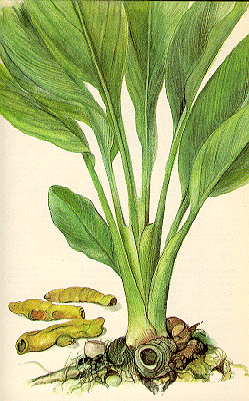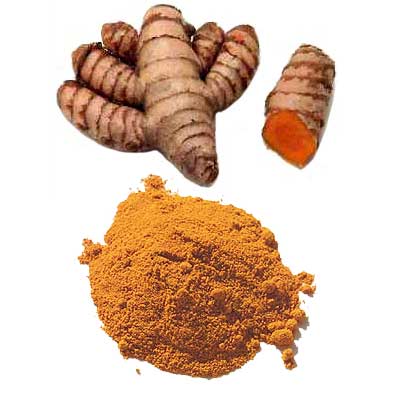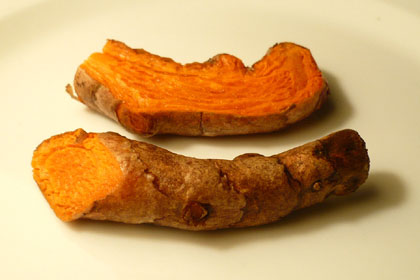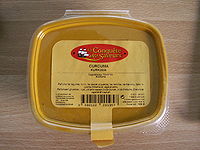| Share |  |
 | |||
God's Good Herbs - Turmeric
 Turmeric is an herb from the ginger family that is most commonly used as a spice to flavor South Asian and Middle Eastern cuisine. It is especially known as a major ingredient in curry powder and is used extensively in India and other Asian countries. The intense yellow pigment in turmeric has also been used as a coloring agent in fabrics as well as foods, such as mustards and cheeses.
Turmeric is an herb from the ginger family that is most commonly used as a spice to flavor South Asian and Middle Eastern cuisine. It is especially known as a major ingredient in curry powder and is used extensively in India and other Asian countries. The intense yellow pigment in turmeric has also been used as a coloring agent in fabrics as well as foods, such as mustards and cheeses.
Turmeric is often referred to as “Curcumin”, a type of phytochemical (a chemical compound found in plants, beneficial to human health) known as a polyphenol. It is turmeric’s main active ingredient and the source of turmeric’s medicinal benefits. The powerful healing properties of turmeric have made it an important herb in both Traditional Chinese and Ayurvedic Medicine. Research over the past several decades verifies the effectiveness of turmeric as an anti-inflammatory, anti-oxidant, anti-bacterial, and anti-cancer agent. It has been used to combat everything from skin disorders to gastrointestinal upset to arthritis to cancer.
Powerful Anti-Inflammatory Agent
The curcumin in turmeric works to prevent the forming of inflammatory compounds in the body, which helps reduce the effects of inflammation such as swelling and pain. This action results in a similar effect to non-steroidal anti-inflammatory drugs (NSAIDS) such as ibuprofen, yet with less harmful side effects. It also acts in a comparable fashion to the pharmaceutical drug cortisone by stimulating the production of natural corticosteroids from the adrenal glands and preventing the breakdown of cortisol. Turmeric is highly regarded by many naturopaths and herbalists as the most powerful anti-inflammatory compound in botanical medicine.
It has helped to prevent and alleviate joint pain occurring in conditions such as rheumatoid and osteoarthritis. In a research study performed at the University of Kansas, rats bred to develop rheumatoid arthritis were given injections of turmeric.  It not only prevented the onset of arthritis in most cases, but it also halted much of the joint deterioration in the rats that had already developed the disease. Curcumin in turmeric appears to slow the progression of Alzheimer’s, an inflammatory condition that seldom occurs among the elderly in populations that consume it on a regular basis.
It not only prevented the onset of arthritis in most cases, but it also halted much of the joint deterioration in the rats that had already developed the disease. Curcumin in turmeric appears to slow the progression of Alzheimer’s, an inflammatory condition that seldom occurs among the elderly in populations that consume it on a regular basis.
A very recent study conducted at the Steel Children’s Research Center at the University of Arizona discovered that curcumin decreased severe inflammation and its resultant intestinal damage for those suffering from inflammatory bowel diseases such as ulcerative colitis or Crohn’s disease. Research revealed that curcumin suppressed the migration of certain types of cells (neutrophils) that tended to congregate in excess amounts at the site of inflammation and subsequently cause damage to the lining of the intestines. Clinical trials also demonstrated that ulcerative colitis patients who took curcumin supplements daily were half as likely to have a relapse as those who took a placebo.
Potential for Reducing Cancer
Turmeric contains antioxidants known as curcuminoids, one of which is five times more potent than vitamin E. Such anti-oxidant power offers great protection against the work of free radicals in many conditions involving inflammation and oxidative damage, including cardiovascular disease and cancer. Offsetting the oxidative damage from free radicals is particularly helpful in reducing cholesterol. Cholesterol reduction in turn protects blood vessels from the build-up of plaque leading to heart attacks and strokes. A significant reduction of the type of free radicals that damage arterial walls was observed in the participants of one study who took 500 mg. of curcumin daily for only one week.
Numerous findings have emerged from extensive research over the past fifty years indicating that curcumin may help in the prevention and treatment of some forms of cancer. It is believed that properties in turmeric may prevent spreading of certain types of cancer cells within the body, as well as slow the growth of new blood vessels in tumors.
A University of Texas study found that people who consumed higher amounts of turmeric in their diets experienced reduced rates of leukemia and colon cancer. In one study, the combination of curcumin and quercitin (an antioxidant found in onions) reduced the size and number of precancerous intestinal lesions in people with colon polyps. It is also thought that curcumin may block the growth of breast cancer cells and slow the progress of cervical cancer in its early stages. Although clinical trials involving humans are ongoing and have yet to produce solid conclusions concerning the effectiveness of curcumin in the prevention and treatment of cancer, the results thus far are promising.  Weight and Insulin Control
Weight and Insulin Control
Turmeric also shows promise of improving glucose tolerance: people who were given this herb showed an increased production of insulin by the pancreas. In test tube experiments, extracts of turmeric enhanced the ability of insulin to metabolize blood glucose threefold. A study done with mice published in the Journal of Nutrition revealed that curcumin might be of value in overcoming obesity. In this experiment, mice that were fed a high-fat diet and given curcumin supplements had reduced weight gain and lowered blood cholesterol levels. The findings suggest that dietary curcumin may have a beneficial role in preventing obesity.
Other Uses for Turmeric
Turmeric aids liver function and detoxification and is thought to prevent fatty acid accumulation in and around the organ. There is also some evidence to show that it promotes bile flow and helps to prevent and dissolve gallstones. It is also helpful for stimulating digestion and aiding in the assimilation of foods.
A topical preparation of turmeric in the form of a poultice or paste has been used to reduce inflammation and swelling due to sprains, wounds, bruises and insect bites. It also serves as a natural antiseptic for preventing infection and speeding up healing in cuts and burns. In India and China, a paste consisting of turmeric is placed directly onto lesions, measles, mumps and chicken pox. Another common use of turmeric is for providing relief from the pain and itching of skin disorders like eczema and psoriasis. Other traditional remedies use the herb for relieving everything from congestion and fever to diarrhea and colic. Usage Guidelines for Turmeric
Usage Guidelines for Turmeric
Turmeric is on the FDA GRAS (Generally Regarded as Safe) list and there are no ill effects when it is consumed in moderation. However, people with gallbladder disease or bile obstruction and pregnant women should avoid taking it.
Turmeric is available in both pill and powder form. As has been mentioned, a paste can be made from the powder for topical uses. Some sources recommend pills or capsules (strength 250 mg. to 500 mg. of curcumin) three times daily in order to experience the full medicinal benefits. The concentration of curcumin in the turmeric extract supplement should be 95% or above - the higher, the better.
Other sources indicate that curcumin alone in a supplement form is not as effective as directly consuming turmeric as a dietary source or in a specially formulated supplement containing other ingredients that promote its absorption. This assertion is based on the premise that it may not be well absorbed alone due to its rapid metabolism in the liver and intestinal wall. However, mixing it with a fat, such as the coconut milk in curry, is a good way to increase its absorption. For an abundance of good information on how to use and cook with turmeric, including recipes, I refer you to the following website: http://homecooking.about.com/cs/spices/a/turmeric.htm Sources:
Sources:
- Heinerman’s Encylopedia of Healing Herbs and Spices – John Heinerman
- Nature’s Pharmacy by Steven Horne
- http://www.enotalone.com/article/9416.html
- http://www.arthritis-treatment-and-relief.com/curcumin-arthritis.html
- http://www.usatoday.com/news/health/2007-01-07-curry-cover_x.htm
- http://findarticles.com/p/articles/mi_m0820/is_n240/ai_19641505/
- http://insciences.org/article.php?article_id=6276
- http://www.fi.edu/learn/brain/micro.html
- http://www.nutraingredients-usa.com/Research/Curcumin-may-cut-body-fat-and-weight-gain-Mouse-study
- http://www.thefoodpaper.com/features/health/turmeric.html
Copyright © 2008-2015 Lucinda Bedogne, CNHP, CNC
Post Your Comment...
|
|
||||||||||||


